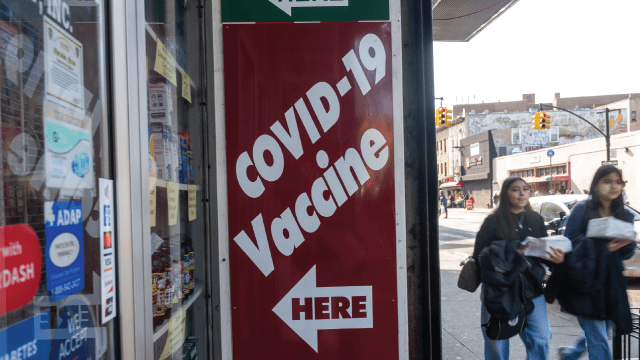
In early October, the U.S. Centers for Disease Control and Prevention changed its COVID-19 vaccine guidelines. Previous guidelines recommended that virtually everyone get a COVID-19 vaccine, but the CDC now advises Americans to work with a health care provider to determine if the vaccine is right for them.
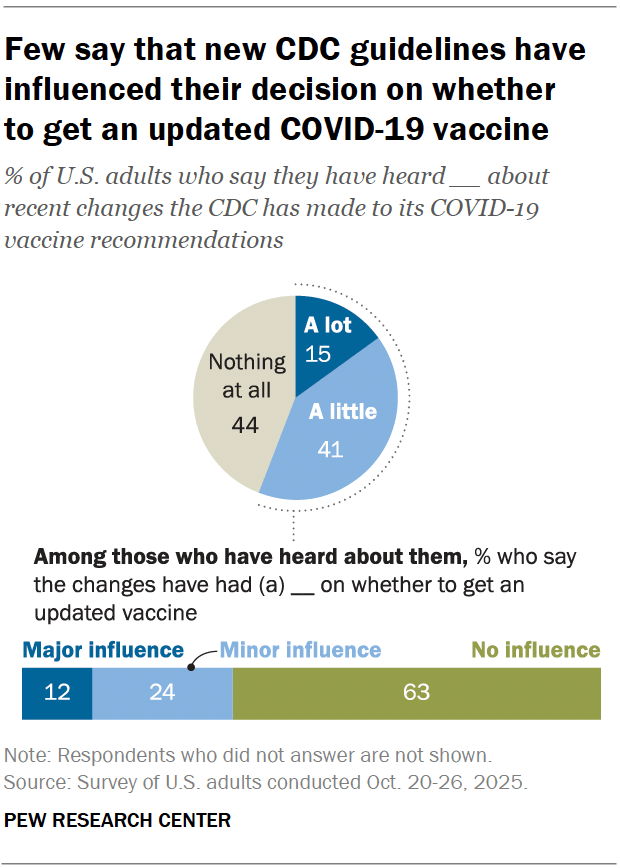
But most Americans either haven’t heard about these changes or say that the changes have not influenced their decisions around getting an updated vaccine, according to a recent Pew Research Center survey.
More than four-in-ten Americans (44%) say they have heard nothing at all about the CDC’s changes to COVID-19 vaccine recommendations. And among those who have heard at least a little, 63% say the changes have had no influence on their decision whether to get an updated vaccine. Overall, 20% both have heard about the changes and say they’ve influenced their decision on whether to get an updated vaccine.
How many Americans want an updated COVID-19 vaccine?
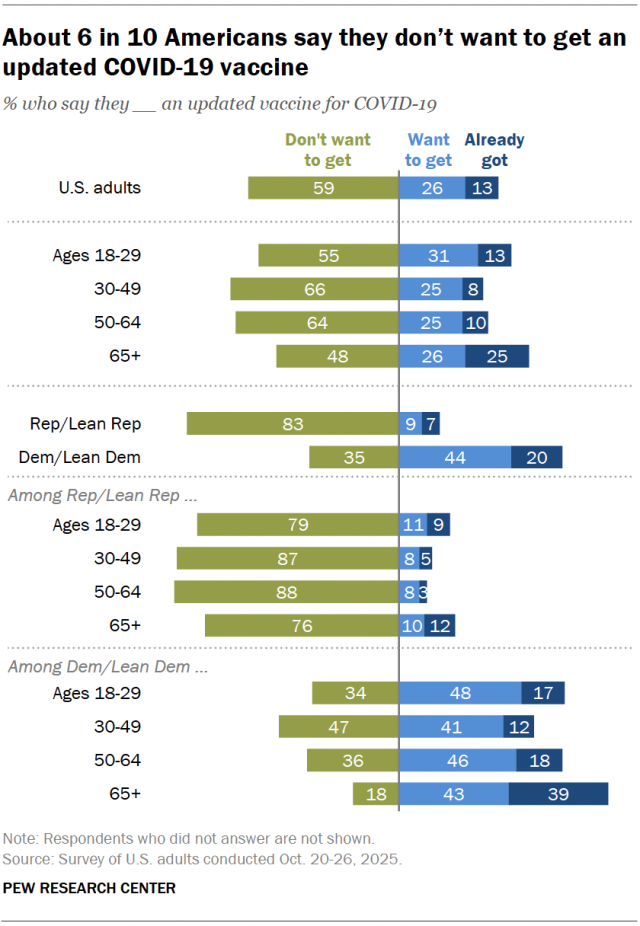
A majority of U.S. adults (59%) say they don’t want to get an updated COVID-19 vaccine. This is roughly identical to the share who said in October 2024 that they probably wouldn’t get the updated vaccine.
In the new survey, 26% of Americans say they do want an updated vaccine. Another 13% say they already got one as of late October 2025.
Differences by party and age
An overwhelming majority of Republicans and Republican leaners (83%) say they don’t want an updated vaccine. In contrast, 44% of Democrats and Democratic leaners say they want an updated vaccine, and 20% say they already got one.
A quarter of Americans ages 65 and older say they already got an updated vaccine – larger than the shares in younger age groups. Older Americans are among the groups most at risk for severe illness from COVID-19.
Yet older Republicans and older Democrats have sharply different views on the vaccine. About four-in-ten Democrats ages 65 and older say they already got one, and 43% say they want to get one. But 76% of Republicans ages 65 and older say they don’t want an updated vaccine.
In summer 2021, not long after COVID-19 vaccines first became available, large majorities of both Democrats and Republicans ages 65 and older said they had received the vaccine.
Familiarity with the CDC’s recent changes to COVID-19 vaccine recommendations
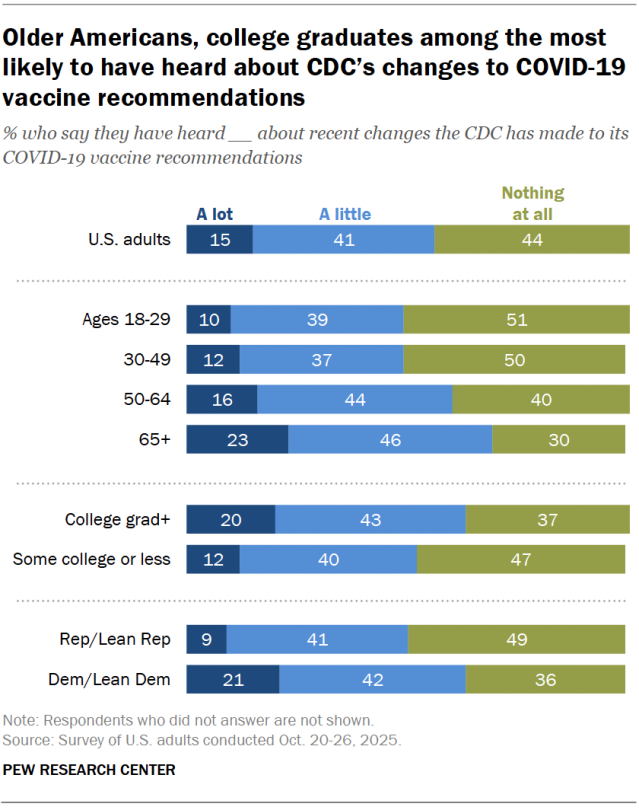
Overall, 44% of U.S. adults haven’t heard about the CDC’s recent changes to its COVID-19 vaccine recommendations. Another 41% have heard a little, and only 15% have heard a lot.
Younger Americans are more likely than older Americans to say they have heard nothing at all about the changes. Roughly half of adults under 50 say they haven’t heard about them, compared with four-in-ten adults ages 50 to 64 and three-in-ten of those ages 65 and older.
Republicans are more likely than Democrats to say they haven’t heard about the changes (49% vs. 36%). In turn, Democrats are about twice as likely as Republicans to say they have heard a lot (21% vs. 9%).
How much have the CDC’s changes to COVID-19 vaccine recommendations influenced vaccine decisions?
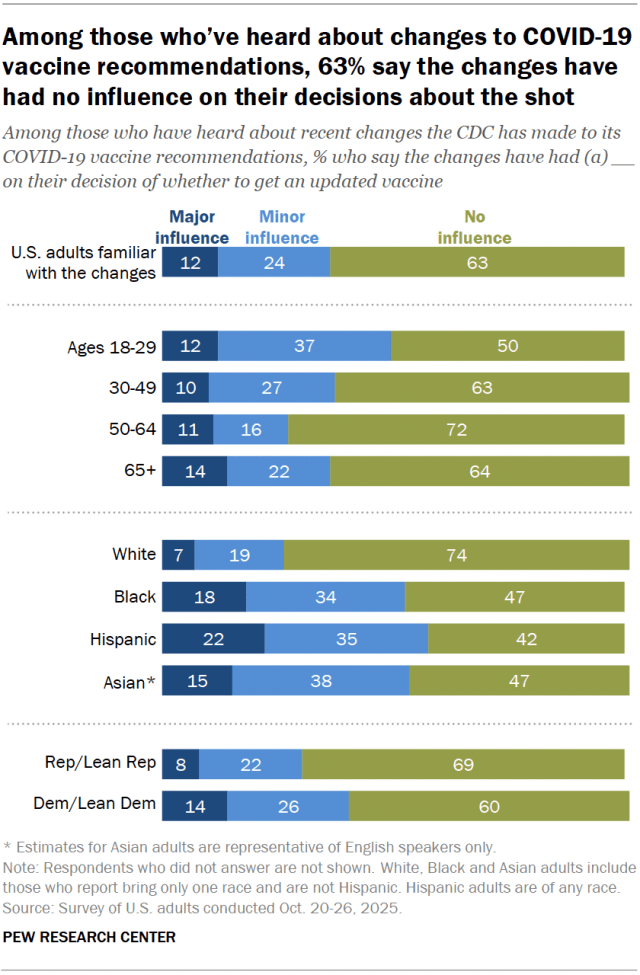
Among those who have heard about the changes to COVID-19 vaccine recommendations, 63% say the changes have had no influence on their decision whether to get an updated vaccine. Another 24% say the changes have had a minor influence, and 12% say they’ve had a major influence.
Views by demographic group
Younger Americans are more likely than older people to say these changes have influenced their decision. Among adults under 30 who are familiar with the CDC’s changes, about half say these changes have had at least a minor influence. That compares with 36% of those 65 and older.
Also among those familiar with the changes, White adults (74%) are more likely than Black (47%), Hispanic (42%) and Asian adults (47%) to say the changes have had no influence on their decision.
In addition, 44% of those who say they already got an updated vaccine and 45% of those who want to get one say the changes have influenced their decision, compared with 27% of those who don’t want to get an updated vaccine.
Trust in recommendations about other vaccines
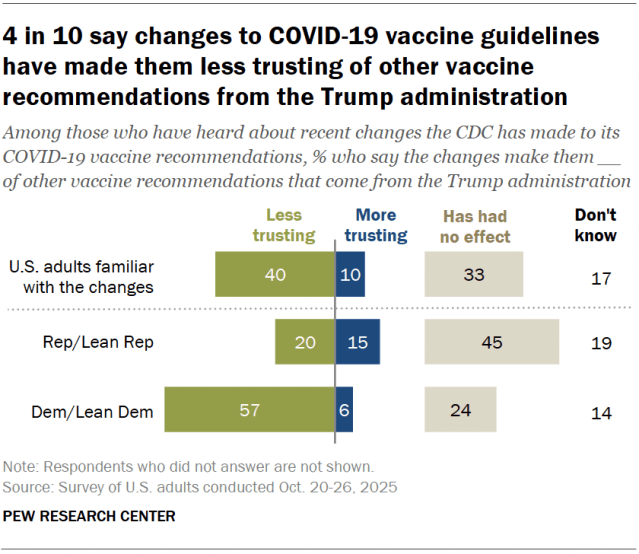
The CDC’s changes to its COVID-19 vaccine recommendations have made many Americans who are familiar with these changes less trusting of other vaccine recommendations that come from the Trump administration.
Four-in-ten of those who have heard about the changes say the changes make them less trusting of the administration’s other vaccine recommendations. One-in-ten say the changes make them more trusting. Still, about half say the changes have had no effect on their trust (33%) or they don’t know enough to say (17%).
In addition to its COVID-19 vaccine guidelines, the CDC has recently changed other vaccine recommendations, including some related to childhood vaccines.
Related: How Do Americans View Childhood Vaccines, Vaccine Research and Policy?
Trust among Democrats and Republicans
Among those who are familiar with the CDC’s changes to its COVID-19 vaccine recommendations, Democrats are far more likely than Republicans to say these changes make them less trusting of other vaccine recommendations that come from the Trump administration (57% vs. 20%). Almost half of Republicans say the changes have had no effect on their trust.
Democrats with at least a four-year college degree (69%) are more likely than those with some college or less education (48%) to say the changes make them less trusting of other Trump administration vaccine recommendations. In contrast, Republicans’ views do not differ across education levels.
Note: Here are the questions used for this analysis, the topline and the survey methodology.

